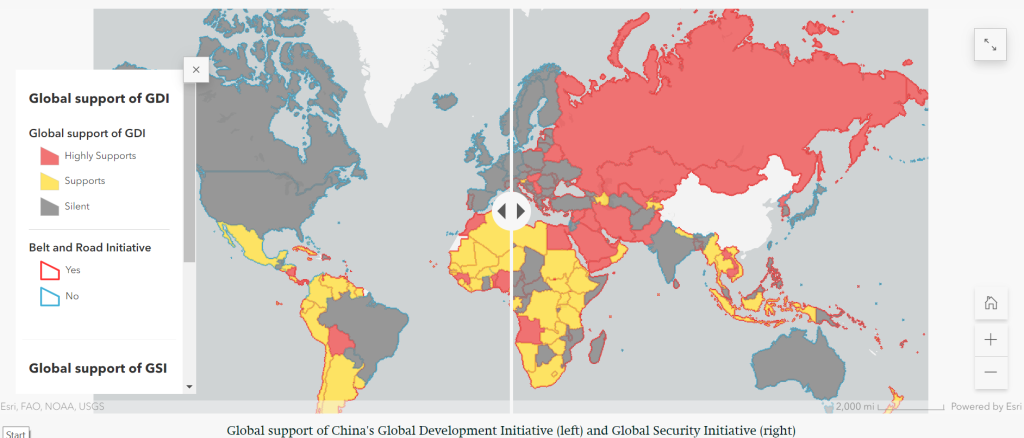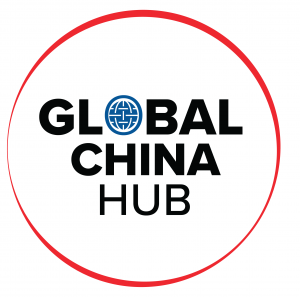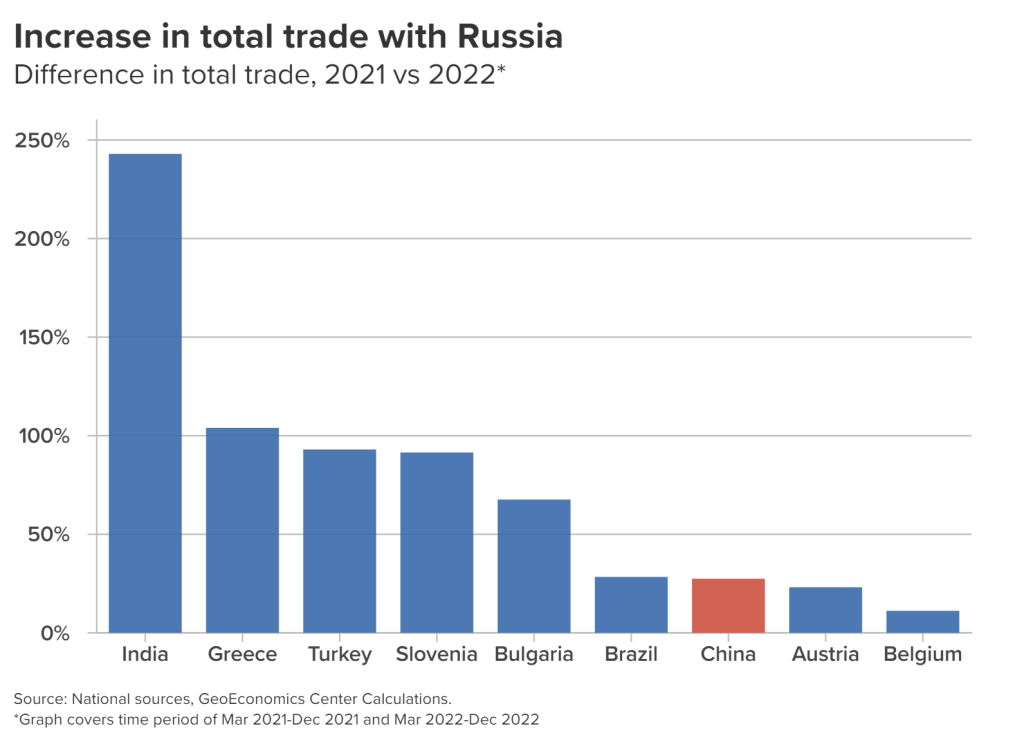Global China Newsletter: With friends like these… China sticks by a Russia in turmoil
Subscribe to the Global China Hub
Following Wagner mercenary Yevgeny Prigozhin’s mutiny in Russia, there’s been little in the way of public reaction from Beijing. But notes of support for Vladimir Putin’s maintenance of internal stability after Foreign Minister Qin Gang met in Beijing with Russian Deputy Foreign Minister Andrey Rudenko have tempered some early predictions that this turmoil might prompt Beijing to curtail support for Moscow’s war on Ukraine.
Putin remains Xi Jinping’s most critical strategic partner not only in countering the United States and preparing for an allied response to a Taiwan crisis — but also in transforming the global order into one more suited to China’s interests and governance model.
Beijing has recently demonstrated a fresh willingness to engage with Washington, welcoming Secretary Blinken to China for talks – with Washington and Beijing pledging to hold more high-level meetings. Expect to see Treasury Secretary Janet Yellen and Commerce Secretary Gina Raimondo make the trip, and we could even see Xi in San Francisco in November at the Asia-Pacific Economic Cooperation Forum.
But make no mistake – Beijing still views Russia as a critical partner in dealing with the menacing security challenges Xi views China as facing, courtesy primarily of the U.S. As our fellow John Culver notes, an unstable Russia “will threaten greater isolation” for China.
We get into all of this and much more below in this edition of Global China, but first I am pleased to welcome our newsletter’s new editor-in-chief, Dexter Tiff Roberts. Tiff is a nonresident senior fellow with the Atlantic Council, an award-winning journalist, and a regular commentator on US-China relations. He is also the Director of China Affairs at the University of Montana’s Maureen and Mike Mansfield Center.
Tiff, take it away!
-Dave Shullman, Senior Director, Global China Hub
China Spotlight
How exactly is China supporting Russia?
So, China continues to back a chaotic Russia. But what exactly is the nature of China’s support for Russia, and what should the United States do about it?
The conventional wisdom in Washington and many European capitals (also the argument made by officials in Beijing) is that China is only providing limited, non-lethal support to Russia’s invasion of Ukraine. But doesn’t any kind of support ultimately help Russia continue its war effort? That’s what Indo-Pacific Security Initiative and Global Energy Center experts conclude, diving into data on heavy trucks, semiconductors, and more.
But China is not alone in providing Russia an economic lifeline. Our GeoEconomics Center breaks down how nonaligned countries such as India and Brazil and even European allies such as Greece and Slovenia continue to trade with Moscow. And with the EU still exporting around $4.7 billion a month to Russia, our experts dug into the nature of that trade. (Spoiler: the biggest categories are pharmaceuticals, machinery, food, and chemicals.)
Mapping global support of GDI and GSI
Our latest interactive web maps complement a new report that examines the countries—mostly from the Global South—that participate in the Belt and Road Initiative and are also involved with Xi’s new signature initiatives.

What are the Global Development Initiative and Global Security Initiative? These new concepts “are China’s ‘blueprint’ for transforming the global order,” as our new report puts it. Along with Xi’s third, more explicitly values-focused formulation, the Global Civilization Initiative, they form the “ideological edge of Xi’s efforts to roll back American primacy”—with a strong emphasis on the Global South.
Click here to view a recap of the report’s launch event, which was highlighted in the South China Morning Post and featured keynote remarks from Rick Waters, the outgoing head of the State Department’s Office of China Coordination.
China’s tech play in Africa and beyond
Many countries in the Global South find themselves playing a balancing act, eager to take advantage of China’s investment push while maintaining their relationships with the United States.
We are digging deep into China’s technology push into the Global South, including its success in selling surveillance equipment and software to developing countries. By adopting artificial intelligence (AI) and biometric identification surveillance tools, some Global South countries have begun to duplicate the authoritarian public security system now in use in China.
The Cyber Statecraft Initiative, part of our Digital Forensic Research Lab, released a report on this issue that uses Kenya, South Africa, and Uganda as case studies. Rather than focus on supplier China, our experts address the actions and motivations of countries buying and building up China-designed security systems.
For more on China’s push to develop and influence global tech norms, including in the Global South, check out our recent panel on the US-China competition in AI. The event was sponsored by the Global Tech Security Commission (GTSC)—a partnership between the Global China Hub and the Krach Institute for Tech Diplomacy at Purdue—and featured keynote remarks from GTSC honorary co-chair US Rep. Mike Waltz.
The invasion of Ukraine and lessons for Taiwan
Turning to what many consider the most likely flashpoint for a military conflict between the United States and China, Atlantic Council experts have produced notable work tying Taiwan Strait tensions to the hot war happening in Europe.
The GeoEconomics Center and Rhodium Group published a new study assessing coordinated G7 economic sanctions on China in the event of a Taiwan conflict, a one-of-its-kind analysis of the considerable costs to the global economy of various sanctions options, informed by research and extensive conversations on both sides of the Atlantic. They show how sanctioning China is a whole different ballgame than sanctioning Russia but that China is not “too big to sanction”.
And the Global China Hub, along with the Scowcroft Transatlantic Security Initiative, recently dove into the lessons from Ukraine for Taiwan crisis planning. One conclusion from the report: “Supporting Ukraine is not a detraction from deterring China if it leads to an outcome in which Russian aggression is thwarted, as that also enhances deterrence regarding Taiwan.”
De-risking on China and getting allies on the same page
Following the G7 summit in Japan, where the United States successfully pushed to get China’s use of economic coercion included in the joint statement, and the Trade and Technology Council meeting in Sweden, where the United States and EU struggled to reach complete agreement on how to deal with China, “de-risking” has become the new catchword replacing decoupling.
A piece by the GeoEconomics Center’s Jeremy Mark looks at how de-risking has already been going on for a while now. Foreign fund managers have been selling vast amounts of securities over the past two years in response to Xi’s policies targeting private businesses, China’s failed rebound from its COVID-zero policies, and mounting US-China tensions.
Europe took a major step in this de-risking direction last week when it released an economic security strategy, which our experts say is one giant subtweet of China. But, as debated by a panel hosted by the Hub and the Europe Center, a cooperative transatlantic approach to China is still far from a reality.
But what could this more united approach look like in critical areas like emerging tech? Scowcroft Center’s Peter Engelke and the Hub’s Emily Weinstein answered this question in a new report and panel discussion as the culmination of a year-long project to develop a coherent strategy for the United States and its allies and partners to compete with China around technology.
And that’s just a taste of the Council’s recent work on China. Here are some more quick hits to end on.
ICYMI
- Europe Center’s Petr Tůma explored the drivers of Taiwan’s growing ties with Central and Eastern European countries.
- Scowcroft Middle East Security Initiative’s Dale Aluf released a report on China’s subsea-cable power in the Middle East and North Africa.
- Scowcroft Forward Defense program’s Keir Lieber and Daryl Press discuss how China’s nuclear buildup could drive a nuclear arms race in their report on the new era of tripolarity.
- The Hub’s Niva Yau looked at how Central Asian leaders risk becoming trapped in a too-tight relationship with Beijing, which was complemented by Eurasia Center’s John Herbst and Andrew D’Anieri’s look at how Central Asia’s nervousness toward China provides an opportunity for the United States.
- GeoEconomics Center’s associate director Ananya Kumar looks at China’s goals for its digital currency.
- An article from the GeoEconomics Center’s Sona Muzikarova explores how China is losing Eastern Europe by analyzing reductions in FDI.
Hub Highlights
Welcome to our new fellows!

Global China Hub
The Global China Hub researches and devises allied solutions to the global challenges posed by China’s rise, leveraging and amplifying the Atlantic Council’s work on China across its 15 other programs and centers.



Follow us on Twitter @ACGlobalChina